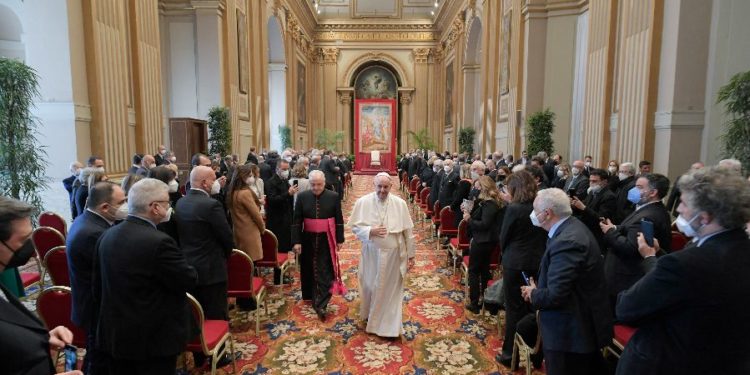With the rescripts, Pope Francis suspended the reporting obligations to the Financial Intelligence Authority, established by Law 18 of 2013. He authorized the deployment of any necessary interception tool, as well as the use of any seized material without any secrecy restrictions being opposed. He also confirmed for a further 60 days special prerogatives given to the Promotor of Justice.
The inauguration of the 2020 judicial year took place on Feb. 15. Pope Francis underlined that the Holy See had adapted its regulations to international standards. Above all, he expressed “full confidence” in the work of the judicial and investigative bodies. He highlighted how the investigations started from internal reports, which, he said, “demonstrates the effectiveness and efficiency of law enforcement actions, as required by international standards.”
In 2021, Pope Francis stressed that “the normative changes to which the Promoter of Justice referred to have typified the Vatican system in recent years.”
These changes, he said, “will be more fruitful to the extent that they are accompanied by further reforms in the criminal law, especially in the fight against financial crime, and by the intensification of other activities aimed at facilitating and speeding up international cooperation between Vatican investigative bodies and their counterparts in other countries, as well as the initiatives taken by the judicial police of our state.”
He then noted: “On this point, it will be necessary to take into account the overriding need for the current procedural system — also by means of appropriate changes in the law — to ensure the equality of all members of the Church and their equal dignity and position, without privileges that date back to earlier times and are no longer in keeping with the responsibilities that each person has in building up the Church. This requires solidity of faith and consistency of behavior and actions.”
This was an announcement of a legislative change allowing the Vatican tribunal also to prosecute cardinals and bishops, who until then could only be tried by the Court of Cassation, the Vatican’s supreme court, presided over by a cardinal.
It is no coincidence that the pope returned to this subject in his 2022 inauguration speech.
“Among the most relevant innovations,” he said, “I would like to underline, for an ever more full and shared implementation, in particular those which, by modifying the law on the judicial system, have established that the office of the Promoter of Justice their role in the three levels of judgment. In this way, it was intended to respond to the priority need for equality between all members of the Church and their equal dignity and position to emerge in the current procedural system, without privileges dating back over time and no longer in keeping with the responsibilities that each belongs to in the aedificatio Ecclesiae [building up of the Church].”
In practice, Pope Francis has not only personally taken the reins of judicial activity but, with his speeches, positioned himself as the guarantor of the current reforms.
This is notable because, in general, previous popes have preferred to limit themselves regarding the legislative and judicial activity of the state, renouncing the actions that once belonged to the pope-king.
The Fundamental Law of Vatican City State, promulgated by Pope John Paul II in 2000, said that “the legislative power, except in cases that the Supreme Pontiff intends to reserve it for himself or other instances, is exercised by a Commission composed of a Cardinal President and other Cardinals, all appointed by the Supreme Pontiff for a five-year term.”
(Story continues below)
The pope, therefore, delegated the legislative power of the state, assuming it only in particular cases. Francis’ judicial activism, in contrast, gives the impression of a pope fully involved in the reform processes.
Several questions remain. For example, who is working on the reforms announced by Pope Francis? And how are they going about it?
Then there is the need to abide by international standards, to which the pope rightly refers. By adhering to international treaties and conventions, a state must limit itself in its sphere of action. This applied to Vatican City State with the legislation combating money laundering and the financing of terrorism, as well as with the criminal legislation of 2013.
As sovereign of the Vatican City State, the pope exercises his supreme powers within the state in his dual capacity of a spiritual ruler and temporal monarch. Nevertheless, as the head of state and within certain constraints, the Roman Pontiff can limit himself. He has done this due to growing international cooperation and to ensure a more effective pursuit of the common good.
In this case, the long-established principle that prima sedes a nemine iudicatur (no one judges the first see) falls because international treaties show that the Holy See agrees to refer to international tribunals in cases of particular disputes.
This means that, at the end of the Vatican finance trial, the accused could also appeal to the European courts, where, among other things, a different code is in force and the pope is not the supreme legislator.
Credit: Source link




